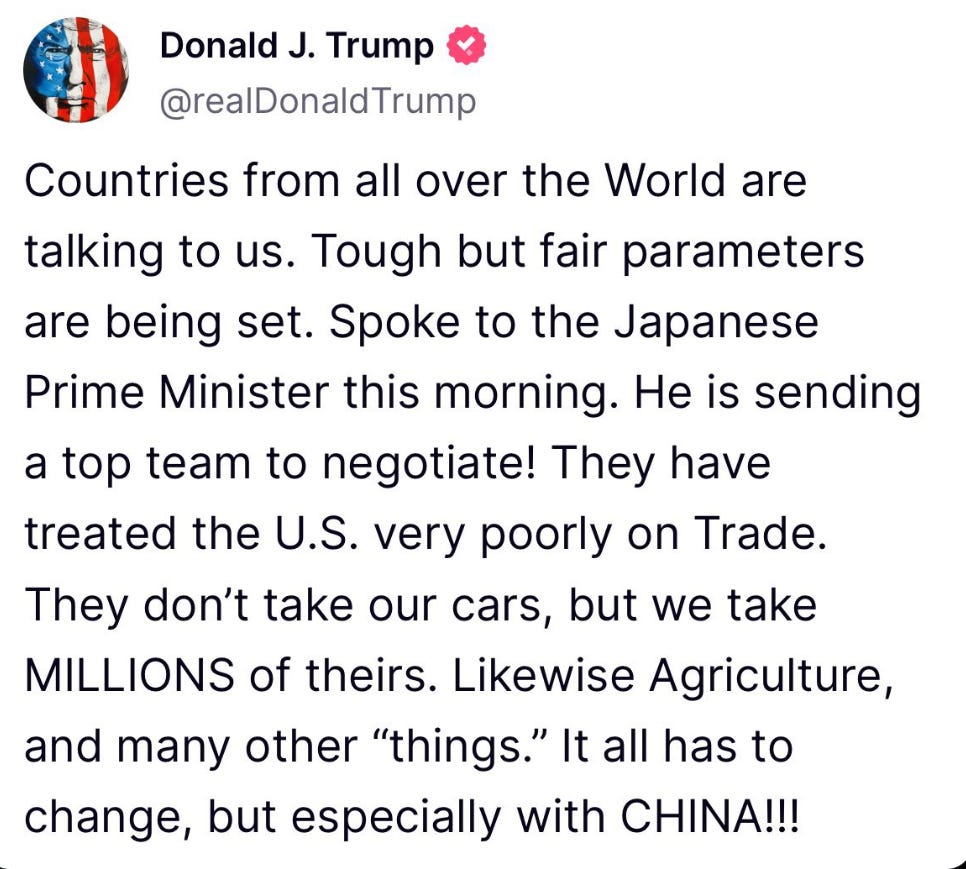Does Anybody in the Trump White House Understand the Automotive Trade?
Key administration officials, including the president himself, are confused about why American cars don't sell more globally.

The Trump administration is committed to its trade war on, well, everyone. Even the penguins.
In their rush to defend “Liberation Day,” some of the administration’s top officials, including the president himself, have loudly complained about trade deficits they see as the consequence of unfair treatment of American products and firms.
One of those industries they’ve singled out is the automotive trade. Stephen Miller, who serves as deputy chief of staff for policy in the White House, took to social media and warned that our automotive trade deficit with Asian and European countries is in the tens of billions of dollars:
The culprit, in Miller’s eyes, is that there’s an embargo preventing American cars from entering those markets:
Miller’s tweet was boosted by Vice President JD Vance, who has in recent days returned to social media to defend the administration’s posture.
President Donald Trump seems to agree with their analysis, given his own remarks on social media:
Let’s start with where the Trump administration is correct. American cars do indeed sell poorly across Asia and Europe.
In Japan, you can’t find an American car in their top 20 best-selling models. In Europe, European and Japanese models dominate their sales charts.
But you might notice once difference between the two markets: the fourth most popular car in Europe, with over 200,000 sales in 2024, was the Tesla Model Y.
Tesla is an American firm. Now, to be fair to Miller/Vance/Trump, the European Model Y is produced in Tesla’s Berlin plant in Germany. But that’s not because there are embargoes on American cars.
In 2022, over 100,000 U.S.-made cars were exported for sale in Europe. That’s about seven times fewer than the number of European-made cars that were exported to the United States.
Trump seems to look at this imbalance and sees unfairness. There has to be some kind of chicanery at work here, right?
The truth is a lot more boring. American car sales have been lagging behind their competitors for years. Ford and General Motors, once lions of the industry, now have a smaller market share than Toyota, Volkswagen, or Honda.
This isn’t because our major competitors are blocking American cars from entering their markets. It’s because people just don’t want our cars.
American manufacturers have tried to adapt to global tastes. Ever heard of the Ford Puma? You probably haven’t because Ford doesn’t even sell the small crossover here — it does sell it across Europe. To America’s credit, it was actually the bestselling car in the United Kingdom last year.
But a quick look at the list of most popular cars in the UK will show you that the Puma and the Model Y were the only American cars to hit the top 10 last year. For many consumers, American cars aren’t considered as reliable as Japanese models or as plush and tech-forward as German or Korean ones.
And even Chinese vehicles, which were once considered a non-entity in the global race, are starting to exceed Tesla in winning the race for the most electric vehicle (EV) sales.

One reason why that might be is due to cost, but there’s also build quality. Teslas are known to have fantastic software and not-so-fantastic hardware, with panel gaps, creaks/rattles, and unevenly applied paint being endemic problems for their cars. One thing Build Your Dreams (BYD), the big Chinese EV company understands, is that you don’t want to spend tens of thousands of dollars on a vehicle that feels like it was put together by a toddler with a Lego set.
Even here in the United States, American consumers often opt out of American models. Major foreign firms like BMW, Volvo, Polestar, Mercedes, Kia, Hyundai, Toyota, and Honda now have a large manufacturing presence in the United States that is responsible for pumping out cars that Americans want.
If you look at the best-selling models of 2024, just three were American companies (GMC, Tesla, and Ford). The single bestselling car of 2024 was the Toyota RAV 4 (which is made in both Canada and Japan).
Would the Trump administration really argue that Americans are being pushed into buying quality Toyota crossovers because of…trade policy? No, we’re buying them because they’re reliable and well-built cars for an affordable price.
The administration risks developing its own Theory of Everything — one theory that explains all you need to know about a subject — when it comes to manufacturing and trade.
It’s simply not true that trading barriers are the reason why American autos are falling behind. Tesla is not being surpassed by BYD because of some tariff or import quota somewhere. BYD simply makes more affordable, higher quality cars. Toyota’s SUVs are simply much more reliable than Ford’s.
If we want to compete, we need to start making better cars. All the tariffs in the world can’t make a consumer want a worse product.






They're being intentionally dumb. By being dumb it increases the brute force of the tariffs, rather than being bogged down by detail.
Basically, Trump has approached trade in the same way as liberals in the past used disparate impact to disrupt what they saw as American segregation. Prima facie fairness doesn't matter: quotas and representation and results are what matters.
Perfectly written